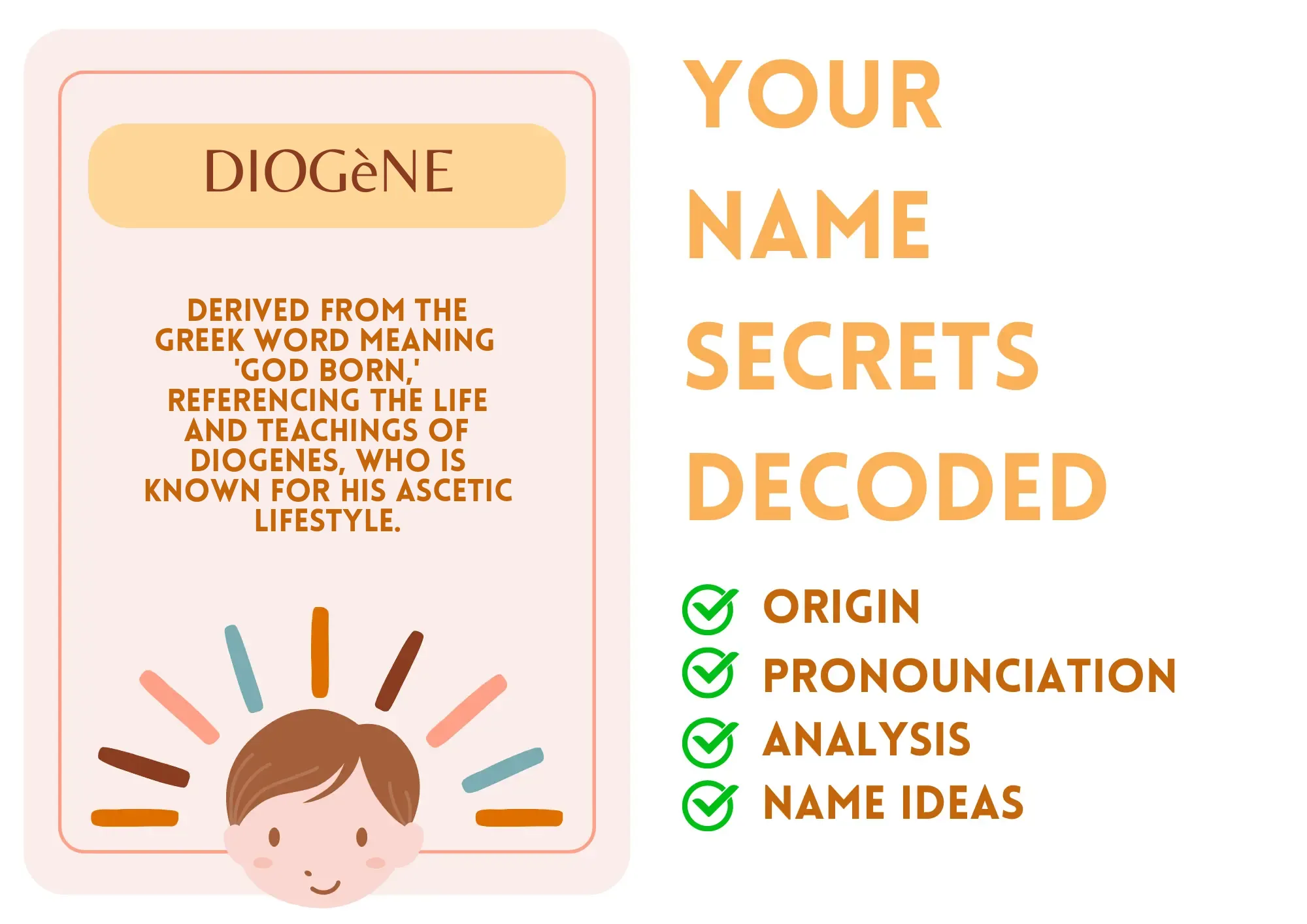
Diogène
Diogène is a unique and historically rich name with roots in ancient philosophy, most commonly associated with Diogenes of Sinope, a prominent figure in the philosophical school of Cynicism. The name reflects a legacy of challenging societal norms and advocating for a life of simplicity and virtue.
While less commonly used as a given name, Diogène carries a weight of philosophical importance, representing wisdom, individuality, and a will to defy conventional expectations. It encompasses a strong character and evokes deep intellectual engagement.
People often perceive the name Diogène as distinctive and thought-provoking, evoking curiosity and admiration. It is appreciated for its historical significance and unique sound, although it may pose some challenges in spelling and pronunciation for those unfamiliar with it.
Basic Information
Gender: Boy
Sounds Like: dee-oh-ZHEN
Pronunciation Explanation: The name is pronounced with emphasis on the last syllable, where 'dee' is soft, followed by a soft 'o' and a nasal 'ZHEN'.
Summary and Meaning
Meaning: Derived from the Greek word meaning 'god born,' referencing the life and teachings of Diogenes, who is known for his ascetic lifestyle.
Origin: The name Diogène has Greek origins, directly linked to the life and teachings of Diogenes of Sinope in ancient Greece.
Usage: Diogène is traditionally a masculine name, firmly rooted in male historical figures.
Name Number (Chaldean)
Name Number (Pythagorean)
Popularity (Global Rank)
Overall: 107722
Boys: 72681
Most Popular in
Religious and Cultural Significance
Religion: Philosophy
Background: In the context of philosophical thought, Diogenes is revered for his Cynic beliefs, promoting a life based on virtue, self-sufficiency, and social criticism.
Cultural Significance: Diogène embodies a cultural movement that values authenticity, wisdom, and rebellion against societal norms, making it significant in philosophical discussions and historical studies.
Historical Significance: Diogenes of Sinope is known for his radical philosophy and disregard for material wealth, often found living in a large ceramic jar. His historical significance lies in his criticism of social values and his promotion of living in accordance with nature.
Popular Culture
Literature and Mythology: Diogenes appears in various philosophical texts and discussions, often as a symbol of the quest for truth and simplicity.
Movies and Television: While not commonly represented as a character, aspects of Diogenes’ philosophy can be seen in several films and shows that challenge societal norms.
Feelings and Perceptions
Perception: Diogène is often viewed positively among those familiar with its philosophical roots and significance. It carries an air of intellectualism and uniqueness.
Positive Feelings: Intellectual, unique, thought-provoking, strong, rebellious, wise.
Negative Feelings: Some may find it challenging to pronounce or spell, and it may come across as overly esoteric to those unfamiliar with its background.
Practical Considerations
Ease of Writing and Calling: The name Diogène can be a bit complex due to its spelling and pronunciation, especially for those not versed in Greek or philosophical terminology. However, its distinctiveness makes it memorable.
Common Typos and Misspellings: Diogenes,Diojene,Diogene,Diogain
Common Nicknames: Dio,Gène
Diogène Popularity
Diogène Usage and Popularity By Country
| Country | Rank (Overall) |
|---|---|
| Haiti | 4145 |
| Senegal | 10065 |
| Belgium | 15521 |
| France | 27542 |
| Morocco | 29971 |
| Canada | 52966 |
Diogène Usage and Popularity By City
| City | Rank (Overall) |
|---|---|
| Sao Paulo | 23014 |
| Milan | 5743 |
| Birmingham | 10091 |
| Sao Luis | 3985 |
| Lyon | 7391 |
Compatibility Analysis
Famous Persons Named Diogène
No results found for Diogène.
Related Names
Similar Sounding Names:
Dion,Dior,Dionysius

